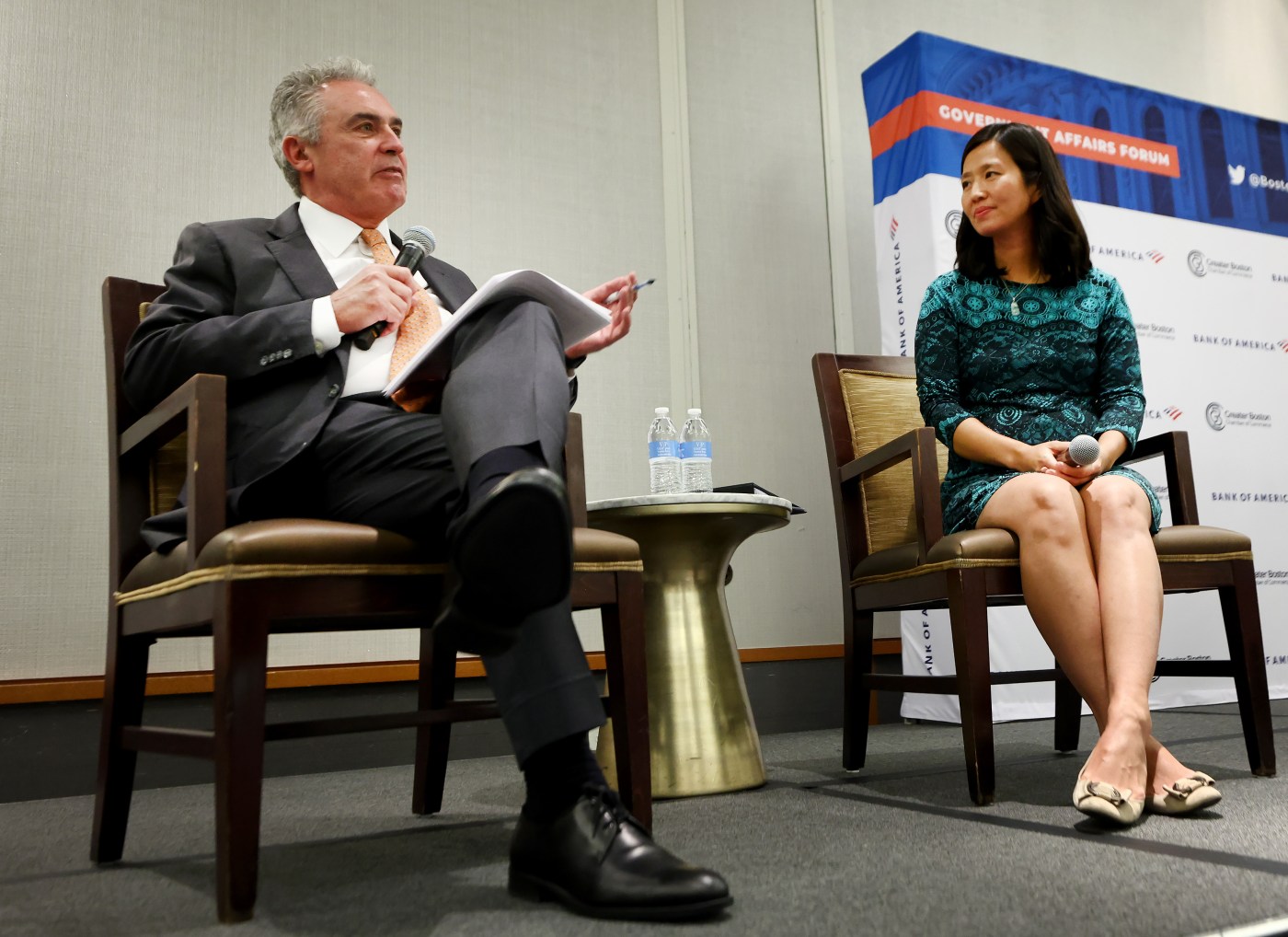
Boston Mayor Wu agrees to limit commercial tax hikes with new legislation as part of compromise with business leaders
Mayor Michelle Wu has drafted new legislation that includes a more “modest” shift of Boston’s tax burden onto businesses, beyond what’s allowed by state law, after reaching a tentative compromise with business leaders who opposed her initial plan.
Details outlining the potential compromise were shared with House and Senate leadership by the business and fiscal watchdog groups involved in the negotiations, and with the Boston legislative delegation by the mayor’s director of intergovernmental relations, on Friday, per separate emails reviewed by the Herald.
“We are glad to see these groups express support for stabilizing taxes and protecting the residents they rely on as their workforce, customer base, and community,” Mayor Wu said in a Saturday statement. “We continue to engage with legislators about next steps to ensure the right balance for stability over the next three years.”
Clare Kelly, Wu’s director of intergovernmental relations, wrote to legislators Friday, stating, “We wanted to keep you updated on our negotiations with senators and the business groups they invited to the table. After the initial meeting with that group, we proposed reducing the limit further to a 185% max shift.
“After continued discussions and feedback from them that it was important to codify changes fully with a new home rule and no executive order, we drafted a clean home rule with the House compromise provisions and a further compromise of a 182% max shift,” Kelly wrote.
In an earlier email on Friday, Kelly had told legislators and the business and fiscal watchdogs included in the negotiations that “the mayor asked me to circulate this draft home rule petition that includes all the components of the compromise and could be refiled through the City Council once there is agreement.”
The draft home rule petition outlines a scenario where the city could tax commercial properties beyond the 175% state limit, in terms of the amount it could shift from the residential to commercial sector, for a period of three years — as a means of fending off what the latest city assessment data show would otherwise be a 27.8% quarterly increase in taxes for the average single-family homeowner in their January tax bills.
The potential residential tax hike is driven by falling commercial property values that are driven by changing post-pandemic work patterns and vacant office buildings and leading to a decline in commercial tax revenue, which, by way of the city’s budgetary structure, is shifting more of the tax burden onto homeowners,
The mayor is seeking to lift the state cap up to 182% in the first year, fiscal year 2025, and taper the increase down to 180% in the second year, 178% in the third year, and return to the state limit of 175% in the fourth year, fiscal year 2028, per the draft home rule petition reviewed by the Herald.
Should the new home rule petition be filed by the mayor, passed by the City Council and approved by the Legislature, the new legislation would represent a significant compromise for Wu.
The mayor has encountered much more resistance from the state Legislature, particularly the Senate where the initial tax bill has not come to a vote, than what she typically sees on the local level, where her policies are frequently passed by the City Council without any significant changes.
The drafted home rule petition includes a lower maximum shift in the first year than the 190% cap the mayor agreed to as part of compromise with House leadership in late July, per an executive order she agreed to sign should the bill be passed by the Legislature and signed into state law.
Wu had initially filed a petition in late March that included a maximum shift of 200% in the first year, the current fiscal year 2025, with step-down caps over a five-year period, of 197% in the second year, 190% in the third year, and 183% in FY28, before returning to the standard state limit in FY29.
Like the agreement the mayor reached with the House, which passed her initial bill on the last day of formal legislative sessions, contingent upon the agreed-upon changes being codified in a mayoral executive order, the city’s newly-drafted home rule petition reduces the length of the proposal, from five to three years.
It also changes the scope, by targeting $45 million in tax relief over three years to small businesses that would be most burdened by a hike in commercial tax rates, defined as those with up to $5 million in annual revenues or up to 50 employees.
The new home rule language, like what was agreed to with the House, would triple the personal property tax exemption cap from $10,000 to $30,000 for commercial properties, which Wu’s office says is also targeted to small businesses.
“This would come from city resources, not state revenues,” Kelly wrote.
Raising the personal property cap, Kelly wrote, would provide relief to an additional 2,183 businesses (4,718 businesses total), exempting an additional $40 million in property value ($52 million total), and providing additional direct savings to small business owners worth (less than) $1 million ($1.3 million total).
While the drafted home rule petition represents quite a compromise for the mayor, it also represents a significant compromise for the involved business leaders and fiscal watchdog groups that had expressed consistent opposition to the tax plan. They had urged Wu to consider alternatives like cutting a city budget that grew by 8% this fiscal year and dipping into the city’s nearly $1 billion reserve fund.
In a letter sent to Senate President Karen Spilka and House Speaker Ron Mariano on Friday, the heads of the Greater Boston Chamber of Commerce, Massachusetts Taxpayers Foundation, NAIOP Massachusetts and Boston Municipal Research Bureau, James Rooney, Doug Howgate, Tamara Small, and Martha Walz, reiterated their concerns that the city chose not to keep budgetary growth in line with inflation at 3% to 4%, “mirroring the discipline shown by the state” in its budget.
“Instead, the city is focused solely on an increase in the commercial real estate tax burden during an industry crisis, including many local small businesses,” their letter states. “Leaders of the business community and public policy experts believe that a viable solution lies in shared sacrifice.”
The letter notes the four groups “acknowledge the city’s publicly stated goal targeting a 9% growth in the average single-family homeowner’s residential property tax bill, in line with the average increase over the next five years.”
“With that goal in mind, the business community is willing to withdraw our objections for a modest, three-year increase in the property tax classification burden shift,” their letter states. “If this approach is adopted, the city would not have to make any spending reductions in FY25. Of course, the city could choose to have a smaller residential property tax increase by exercising our recommended spending restraint.”
The letter outlines a similar tax shift schedule outlined in the mayor’s drafted home rule, with a 181.5% cap rather than 182%, but cautions that the legislation “is not a solution to the complex public finance and economic development challenges the city faces because of reduced commercial property values, but represents a meaningful compromise to immediate residential property tax concerns.”
“Ongoing vigilance and fiscal discipline, with a clear understanding of spending habits,” the letter concludes, “must be demonstrated by the city as it approaches future budgets.”


